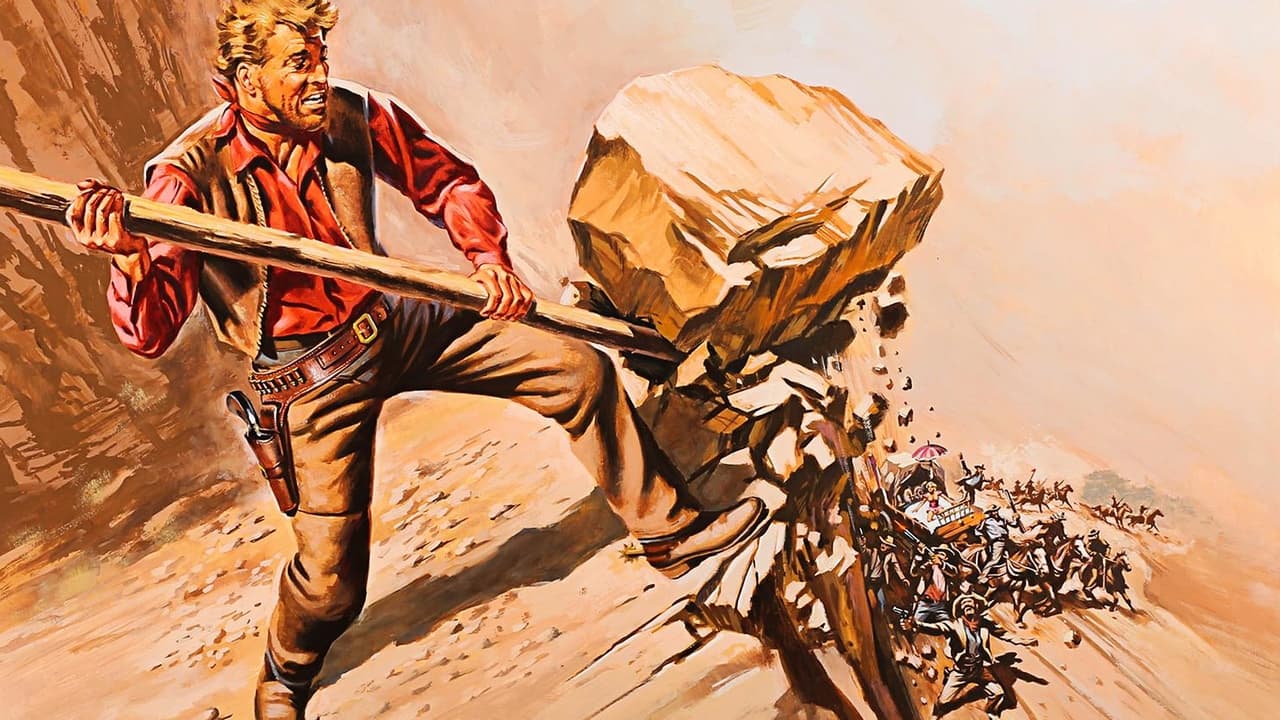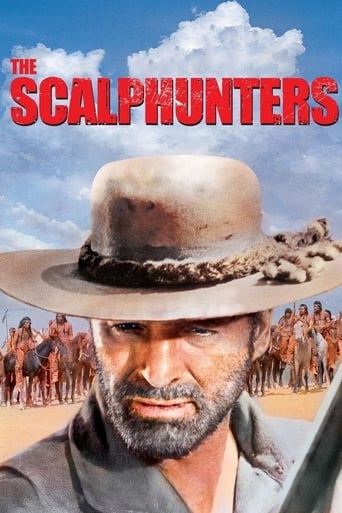

The greatest movie ever made..!
... View MoreBest movie ever!
... View MoreI enjoyed watching this film and would recommend other to give it a try , (as I am) but this movie, although enjoyable to watch due to the better than average acting fails to add anything new to its storyline that is all too familiar to these types of movies.
... View MoreIt is an exhilarating, distressing, funny and profound film, with one of the more memorable film scores in years,
... View MoreBurt Lancaster offers a robust, fun performance as trapper Joe Bass. One day he's accosted by Indians including the character Two Crows (Armando Silvestre), who force him to turn over his prized furs in exchange for a slave named Joseph (Ossie Davis). Joseph is an articulate and well educated man, but is something of a thorn in Joes' side. Joe is hellbent on reclaiming his furs, going so far as to relentlessly tail the savage outlaws who slaughter the Indians. Jim Howie (an amusing Telly Savalas) is the outlaw leader, Kate (Shelley Winters) his high strung wife.Filmed in glorious widescreen by Duke Callaghan and Richard Moore, the Western comedy "The Scalphunters" was written by William W. Norton and directed by Sydney Pollack. While it purports to treat the character of Joseph with some respect, there may still be viewers who will wince at various indignities that he's forced to experience. Nortons' script is generally engaging, with some witty dialogue here and there. It is a delight to see the distinguished gentleman Davis embrace the more comedic aspects to his character, and there's a lot of entertaining sparring between the two Joes (with Lancaster showing himself to not really be all THAT enlightened). Overall, this film is reasonably exciting at times, even if it's not destined to be a classic.It's the dedicated efforts of a superior cast that make "The Scalphunters" work as well as it does for a somewhat overextended 104 minutes. Lancaster and Davis work well together, and Savalas is also fun to watch as Jim becomes more and more exasperated with this pest that's making life miserable for him and his crew. Winters has some appeal, and there's a few familiar faces among the supporting actors like Dabney Coleman (as Jed), and Lancasters' longtime friend and co-worker Nick Cravat (as Yancy).Dedicated Western watchers and fans of the actors will likely have a decent time with this one.Seven out of 10.
... View MoreThe Scalphunters was the first of two films Sydney Pollack directed with Burt Lancaster. In fact according to a recent biography of Lancaster, Burt was literally trying Pollack out on this western before giving him an opportunity to direct the very expensive Castle Keep for him the following year. Personally I think The Scalphunters is a far better film.It's a rollicking good mixture of comedy with some very serious themes involved. It's also the last time Lancaster did any really athletic roles as he was 55 when making The Scalphunters. We all bow to old age at some point.Sydney Pollack actually started his association with Burt Lancaster on the set of The Young Savages where he was an acting coach to some of the street kids who were playing gang members. It was his first introduction into motion pictures, he had previously directed and acted in a number of television productions.Burt is fur trapper Joe Bass who gets an offer from the Kiowa Indians he can't refuse. They'll relieve him of his year's trappings in beaver pelts and he'll get an educated house slave in Ossie Davis. Davis seems born to be a slave, he escapes it from the south, then he's captured by the Comanches who then trade him to the Kiowas and then he's forced on Lancaster. Lancaster is planning to get his pelts back, but a murderous gang of Scalphunters beat him to it and massacre almost the whole band and take Lancaster's furs along with horses and scalps that bring a good bounty. Burt's Joe Bass is not exactly a boy scout, but this crowd truly nauseates him.The Scalphunters are headed by Telly Savalas and his cigar smoking refugee from a bordello of a woman, Shelley Winters. Winters has the best performance in the film, this is her third film with Lancaster with whom she had a self documented fling back in the day. Later on Davis gets captured by The Scalphunters and he has to use his wits to survive among them. But they're going to Mexico where slavery has been abolished.The laughs are mixed in with some serious racial issues all around. Lancaster can't quite accept Davis as an equal, Davis is perfectly willing to go along with The Scalphunters and their genocidal war on the Indians if he'll obtain his freedom through them. And Savalas and his crowd are as mean a bunch as you'll ever see in a film, yet some of the funniest bits in the film involve Winters and Savalas.The Scalphunters is a really funny western that if you think about it teaches some good lessons we could all use.
... View MoreIf you happen to be alive and watching films in the late 60s, you'd be immersed in a period richer than anything we have seen since, I think. People just seemed more receptive to fundamental reinvention where today its assurance we need.There are lots of obvious examples of this. Here's a much less obvious one, and it may be hard to see why.Superficially it is a slight project, a slim entertainment in a common form: a genre film that references the established notions of western justice that has in the standard interstices a story of racial justice earned. (You have to imagine that in those days it was commonly accepted that the black "man" had by dint of intense perseverance finally achieved a place at the table. Also, you have to place yourself in a place where the western was still taken seriously and without irony as the zone where American values were handled, reaffirmed.)Its not obvious today, because notions of race have since shifted. But this was a fairly radical film in its time: more so say than "Guess Who's Coming to Dinner," or "Lilies of the Field." The idea of weaving these two notions of justice together was pretty radical, and extremely ennobling. It was a special event then. Today, its old candy.And that's the power of this, knowing what it was and seeing how tepid the "message" is. Today, we're as likely to see the whore with the golden heart as mattering.Ted's Evaluation -- 2 of 3: Has some interesting elements.
... View MoreWildly entertaining western romp with the still athletic Lancaster (as a frontier trapper) and Davis (as runaway slave) reluctantly teamed against a band of bandits led by Savalas. I noticed this pic as good time fun during a TV showing as a kid, way way before the nice DVD version, and still have fond memories of an easygoing adventure. Lancaster is exuberant in this, despite being well into his middle-aged years; he still comes across as someone who can outfight any man and rassle a grizzly bear on the side. He also presents an iconoclastic character here, supremely content onto himself, with not much use for civilization OR anarchy (represented by the barbaric bandits). Just leave him to do his own thing; if you don't, you're in for a fight - don't matter who you are, as Savalas and his band find out.Savalas is great as the bandit leader, dangerous blow-hard that he is; though not too intelligent, he's still a lot smarter than the other idiots under his rule (including a bearded Dabney Coleman in an early role). His main squeeze is the cigar-chomping floozy Shelley Winters, hamming it up as much as the otherwise all-male cast. Davis, in an odd contrast, comes across as the most sophisticated of the whole bunch, despite supposedly being a slave his entire life; he also proves to be the most duplicitous; he's not simply honorable and disappoints Lancaster more than once. Maybe director Pollack was sneaking in some commentary on the outmoded superior standing of the white race by this point, though I think it was wishful thinking that Davis could get away with as much as he does here in the 19th century. In all, the actors prove to be good hams to the very end.
... View More